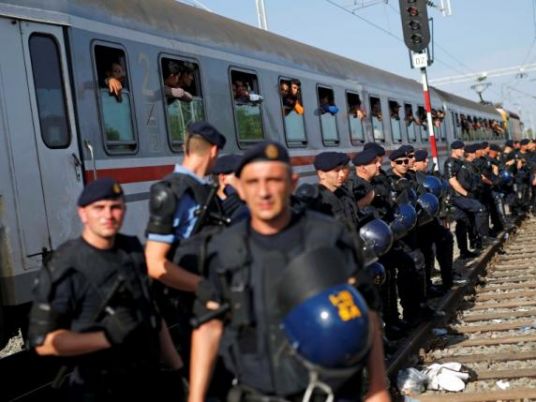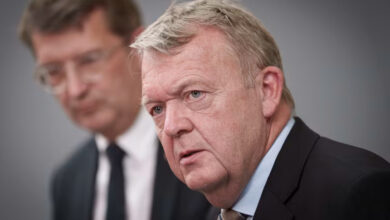
Migrants continued to stream through fields from Serbia into the European Union on Friday, undeterred by Croatia's closure of almost all road crossings after an influx of more than 11,000.
Helpless to stem the flow, Croatian police rounded them up at the Tovarnik railway station on the Croatian side of the border, where several thousand had spent the night under open skies. Some kept traveling, and reached Slovenia overnight.
Migrants have been streaming into Croatia for two days, their path to western Europe via Hungary blocked by a metal fence, the threat of imprisonment and riot police who fired teargas and water cannon on Wednesday to drive back stone-throwing men.
Hundreds evaded Croatian police, trekked through fields and reached the border with Slovenia by train on Thursday, part of a desperate and determined march westwards that is dividing Europe.
Only the main Bajakovo crossing, on the highway between Belgrade and Zagreb, appeared to be open to traffic on Friday, while Slovenia stopped all rail traffic on the main line from Croatia.
Around 150 migrants spent hours overnight stranded at the Dobova railway station on Slovenia's side of the border. Police first said they would be sent back, but then the train proceeded to the town of Postojna, some 50 km (30 miles) southwest of the capital Ljubljana, where there is a refugee center.
Slovenia, which unlike Croatia is a member of Europe's Schengen zone of border-free travel, said it had turned back roughly another 100 who tried to cross from Croatia under cover of night.
The two former Yugoslav republics suddenly find themselves on the path of a huge migration of people westwards from war and poverty in the Middle East, Africa and Asia, the scale of which has sowed discord and recrimination in the European Union.
On Wednesday, the EU called an emergency summit for next week in a fresh bid to overcome disarray in the 28-nation bloc.
Croatian Interior Minister Ranko Ostojic warned on Thursday that Croatia would close its border with Serbia if the flow of migrants continued at the same rate, saying his country was full to capacity.
The president of Croatia told the military to be ready to join the effort to stop thousands of people criss-crossing the Western Balkans in their quest for sanctuary in the wealthy bloc.
Hungary's right-wing prime minister, Viktor Orban, said on Friday Hungary had begun work overnight to extend a fence along its southern border with Serbia to the Croatian section, after police said hundreds of migrants had entered from Croatia.
Orban said 600 soldiers were working on a 41-km stretch and a further 500 would be deployed on Friday and 700 more over the weekend.
Serbian Warning
Late on Thursday, Croatian police announced they had banned all traffic at seven border crossings. “The measure is valid until further notice,” police said in a statement.
Serbia's main highway north into Hungary is already closed by Hungarian riot police on the border.
Much of the Croatian-Serbian border follows the Danube river, making it difficult to cross outside the official border crossings. But at Tovarnik, migrants simply walked through fields.
"We are so exhausted," said Hikmat, a bare-footed 32-year-old Syrian woman from Damascus, who said she had been traveling for two months with her son. "Look at me. I just want to get anywhere where we will be safe," she said.
"We see them, but we pretend not to," said a Serbian police officer.
Serbia warned its neighbors against shutting down the main arteries between them.
"We want to warn Croatia and every other country that it is unacceptable to close international roads and that we will seek to protect our economy and every other interest before international courts," Aleksandar Vulin, Serbia's minister in charge of migration, told the Tanjug state news agency.
Authorities in Croatia shuttled some of the migrants to reception centers near Zagreb, but many broke away or simply slipped through the net of overwhelmed police and set off for the Slovenian border, just 30 km (18 miles) from the Croatian capital.
Slovenia said police had stepped up checks in the border area with helicopter and land patrols. The government there says it will enforce EU rules that asylum seekers remain in the country where they first entered the bloc, and "illegal immigrants" be deported.
In Tovarnik on Thursday, scuffles broke out as Croatian police tried to get women and children to board buses to reception centers near Zagreb. Women screamed and children cried. Many refugees refuse to be sent to reception centers, arguing they should be allowed to continue their journey to western and northern Europe.
An Iraqi from Baghdad who gave his name as Riad said he had been separated from his wife and child. "Only women and children are now allowed onto buses. My wife and child are gone and they (police) do not allow me to join them. My phone does not work."


